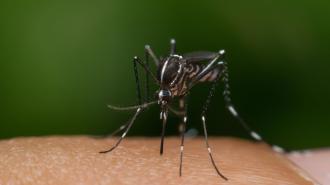The lowly and loathed mosquito can lay claim to the title of deadliest animal on Earth — humans excluded — thanks to the wide variety of illnesses borne on their buzzing wings. These include parasitic infections, like malaria, and arboviruses, including dengue, West Nile, yellow fever, Zika, and chikungunya.
With so many threats in one little bug, blunting the impact of mosquitos can have an outsize impact on public health. Now, new research out of the University of Leeds has identified a way to protect against multiple different viruses: mosquito saliva.
“The saliva is biologically active and helps the mosquito feed but also helps the virus to infect and replicate,” the researchers wrote in their study, published in PNAS.
A new target: By targeting a specific molecule in mosquito saliva called sialokinin, the researchers believe it could be possible to protect against mosquito-borne disease.
“Our research suggests that blocking sialokinin, for example through a vaccine or a topical treatment, may be an exciting new approach that prevents severe disease following infection with numerous distinct viruses,” Leeds School of Medicine associate professor Clive McKimmie said.
By targeting a specific molecule in mosquito saliva, the researchers believe it could be possible to protect against multiple mosquito-borne diseases.
Arbovirus assistance: Mosquito saliva is a complex witch’s brew of various compounds, which facilitate their sanguinous feeding habits.
Previous research has shown that sialokinin increases blood flow, making for a bigger dinner. But when they examined the impact of sialokinin on mouse skin cells, the researchers noticed that it also helps the viruses have an easier time of things, too.
The mosquito saliva increased the permeability of the blood cells, making the cells more vulnerable to the viruses. When you’ve got more of these cells near the skin, that gives the viruses more opportunities to infect and replicate — and potentially cause severe disease.
If vaccines or topical treatments can take aim at sialokinin, it may provide panviral protection, although more research will be needed to take this discovery from dish to people.
The researchers may have also figured out why some mosquitoes don’t transfer viruses to humans, said Leeds PhD researcher and study lead author Daniella Lefteri. Anopheles mosquitoes are bad at spreading most viruses — and their saliva is missing sialokinin.
“Our work has increased our understanding of the way mosquito-derived factors influence infection in a host’s body,” Lefteri said.
We’d love to hear from you! If you have a comment about this article or if you have a tip for a future Freethink story, please email us at tips@freethink.com.
